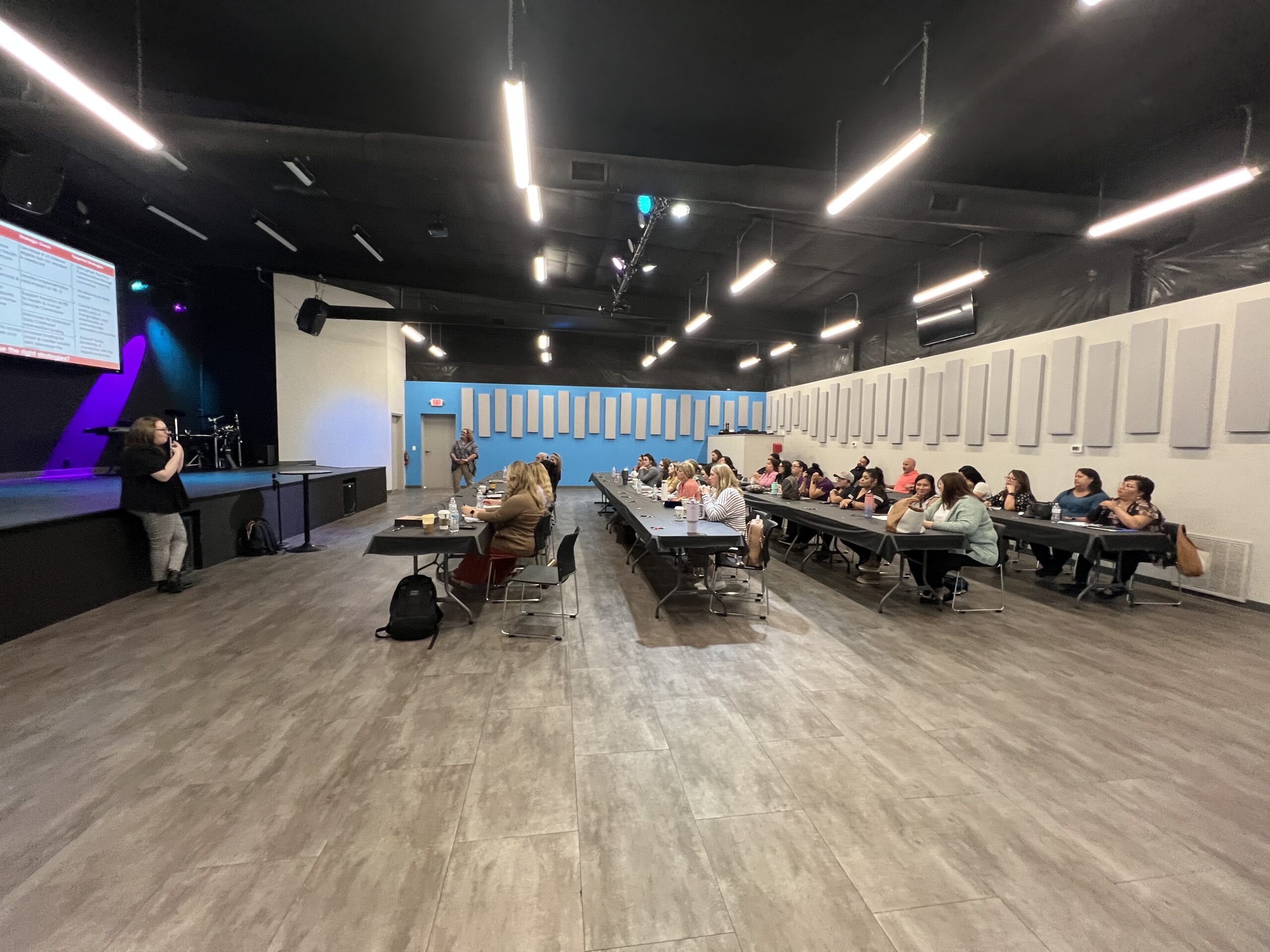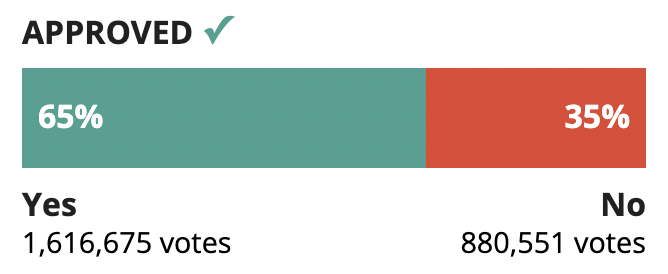
Kaitlyn Newell, Associate Director of Early Education, speaks to a group of child care providers, policymakers, and business leaders in Midland, TX. Source: CHILDREN AT RISK
(TX – November 16, 2023) – Each Fall the CHILDREN AT RISK Early Childhood Team sets out on our statewide Texas Tour. This year we traveled hundreds of miles to visit the palm trees of Brownsville and McAllen, the prairie lands of Amarillo and Lubbock, the oil fields of Midland and Odessa, the mountains of El Paso, the pine trees of Tyler, the city lights of Houston and up-and-down the I–35 corridor from San Antonio/Austin to Dallas/Fort Worth. The Tour isn’t just about seeing the beauty of our great state, but to meet and be in community with its engaged and beautiful people, especially the people who have dedicated their lives to supporting young children and their families. Every year we have community conversations about what the data is telling us about the state of early childhood education in Texas. We also do a debrief on everything that happened in the latest Legislative Session or what we are preparing for in the upcoming Legislative Session. We celebrate what is going well and we listen to the challenges communities are facing. Here are a few of the highlights from this year’s Texas Tour:
Proposition 2
Excitement was in the air around Proposition 2, a constitutional amendment on the statewide November ballot to allow local city and county governments to provide tax relief to child care providers serving low-income children. This was on the ballot due to passage of SB 1145 and SJR 64, authored by Senator West and Representative Talarico, 2023. As the Tour coincided with early voting during the first three weeks of October 2023, we were able to provide messaging and resources to all the communities about the importance of Prop 2, answer questions and even do a little media push.
Between October 2nd and October 20th, every major media market in the state highlighted the importance of Prop 2 and early childhood education, resulting in 84 media hits. The results were clear and immediate. For the first time ever, Texans had a chance to vote for child care and 1.6 million voters said Yes to Child Care. Proposition 2 passed with 65% of the vote with results topping 70% support in some of the state’s biggest and smallest counties.

Source: The Texas Tribune
Proposition 2 will give property tax relief to many child care programs across the state. However, the proposition’s passage was also proof that Texans care about children and families. They care about the work professionals do in child care programs every day. The next step is to work with local city and county officials to adopt and implement this tax exemption so local providers can start benefiting. We hope that lower property taxes will allow more money to keep tuition lower for families, and to increase wages for educators and provide high-quality programs for children. Children at Risk is in the process of developing a toolkit for local communities to use with their local city and county officials. If you have any questions before the toolkit is complete, please don’t hesitate to contact us.
ECE Workforce
“We need to stop investing in stuff and start investing in people,” is what one child care provider (and many more) told us during the Texas Tour. Child care programs from across the state shared how finding staff is still their number one issue. Without staff, there is no child care. No matter how many expansion grants are given to reduce child care deserts or how many curricula and materials are purchased, without investing in staff, in educators, Texas will never have an adequate supply of child care.
Financial Support for Infants & Toddlers
Child care providers across Texas are facing challenges to provide high-quality care to infants and toddlers across the State. As local school districts provide pre-kindergarten to more 4-year-olds, and now more 3-year-olds, child care programs are struggling to keep their doors open providing more costly care for infants and toddlers. With child care programs struggling to find staff, access to child care for the parents of infants and toddlers has suffered. In every community conversation, we discussed the need not just for more investment in child care, but with a focus on how to support programs who serve infants and toddlers.
In 2023 child care providers and early childhood advocates and stakeholders advocated for a $2.3B budget rider which would have provided funding for recruitment and retainment of educators and continued funding for stabilization grants. While the funding was not in the final budget, this experience activated the Texas child care community to use our our advocacy muscles to ask for funding – an experience that will prove useful moving forward.
During the Texas Tour, as a community, we explored options for the next Legislative Session, including a base payment for programs serving infants and toddlers, in addition to the current reimbursement rates. We talked through using the true cost of care to set reimbursement rates instead of the market rate would provide programs with additional funding. We discussed the inequities of a child care program not receiving the reimbursement rate based on their Texas Rising Star level because of the poverty of the communities they have chosen to serve, ultimately punishing high-quality programs serving low-income communities.
Alignment of Services for Children and Families
The need for an alignment of services for children and families was another concern consistently shared at numerous stops along the Texas Tour. Not only did the Texas Tour bring together child care providers and early childhood education stakeholders, but school board trustees joined the conversations, early childhood intervention professionals, and health care professionals too. With a variety of voices in the rooms, conversations around alignment of services were focused on children and families in two areas: how can families access services more easily and how can services be coordinated to work together to support children and families. Access to Early Childhood Intervention for children with special needs, Medicaid services, child care subsidy, WIC services, etc. all have their own application process. Questions that were discussed included; how can we simplify the application process? How can we make it better for families to access these services? What does outreach look like so families know where to go for help?
The second area was regarding the need for local conversations to address the need for high-quality child care. Questions that surfaced included: how do communities bring together Independent School Districts, child care programs, Head Start and Early Head Starts, business leaders, elected officials and families to build a holistic early childhood system for all children birth through 5-year-olds. As new employers come into the community, what are they or the city and county authorities doing to make sure there is enough child care to support the workforce? What do families in communities need in regard to non-traditional care and off-hour care? Is there enough to support the workforce? How are local agencies working together to provide easier access to the services available to families? Yes, alignment and increased avenues for communication needs to happen at the state level between the six state agencies that coordinate services for young children, but it also needs to happen at the local levels. The people who are on the ground every day working with children and families, knowing what they and their community need.
Family Child Care Homes
Child care centers have bounced back after the Pandemic but family child care homes have not. In almost every corner of the state, there are fewer family child care homes now than there were before the pandemic. While family child care homes serve fewer children than a child care center, they are vital to all communities, especially rural communities. Some parents in communities of color or shared beliefs prefer family-based child care. As we continue to think about how to make our current early childhood education system more holistic, we must ensure family child care homes are a vital part of that infrastructure. Not only are family child care homes important for the children and families they serve but they are a small business opportunity for the person running the family child care home. This small business is a way a person can provide for their family while supporting other working parents and their children.
Children with Special Needs
Communities across Texas highlighted the need for more supportive services and child care for children with special needs. Providers indicated that they had seen an increase in the number of children needing special services since the COVID pandemic, while parents shared that they often had trouble finding child care for their children with special needs. With the current staffing shortages in the child care industry, many providers talked about the struggles they face in finding sufficient staffing and providing professional development for their teachers to support children with special needs. However, it’s important to also recognize the incredible work communities are doing across Texas for children with special needs. We heard from several communities how they worked together to improve the continuity of care for both mothers of children with special needs and the children themselves. Despite the great work they are doing statewide, we must continue to invest in our educators and provide them with the tools and resources they need to support ALL children in Texas.
Next Steps
On our very first stop of the Texas Tour, the community partner who was hosting us had this African Proverb stenciled on their wall in the conference room, if you want to go fast, go alone; if you want to go far, go together. We have a long way to go to improve the early childhood education system in Texas. Now that Proposition 2 has passed, we must work together to get cities and counties to fully implement the tax break for eligible child care providers. Texas must find the new revenue necessary to fully invest in child care for working families. We have enough children to fill every child care center, Head Start and Early Head Start, family child care home, and ISD Pre-K program, what we are missing are educators to teach these children. Texas must invest to support those educators and the children to access high-quality child care.
We must transform our current fractured, multi-agency reality into a holistic system. We must focus on:
- Increasing infant and toddler care
- Aligning services for children and families, making it easier for families and children access the services they need
- Ensuring family child care homes are part of the plan
- Adding more money at all levels of government-local-state-federal
- Supporting our early childhood professionals who all get paid too little for the passion and expertise they bring to their jobs every day
The to-do list is long, but those three weeks spent traveling this state in conversations with all of you, grounds us in our why. It reminds us just how very far we have to go, but it also reminds us that we are not alone!
With much respect and appreciation,
The CHILDREN AT RISK Early Childhood Education Team
Questions? Thoughts? Don’t hesitate to reach out to us below!
Kim Kofron
Senior Director, Education
kkofron@childrenatrisk.org Neomi FletcherAssistant Director, Early Childhood Education
Kaitlyn Newell
Associate Director, Early Childhood Education
knewell@childrenatrisk.org Jacob WestjohnProject Coordinator
jwestjohn@childrenatrisk.org
MORE LIKE THIS
Virtual Press Conference: CHILDREN AT RISK and Community Leaders on the Future of the Child Tax Credit
C@R and researchers, family policy experts, and community leaders will hold a press conference urging Congress to ensure that any revisions to the Child Tax Credit (CTC) maintain its proven support for working families. Media Contacts:Morgan Gerri,...
Recap: The State of Black Children in Texas 2025
On February 13, 2025, CHILDREN AT RISK presented the virtual learning summit The State of Black Children in Texas. Each year, the State of Black Children in Texas Summit serves as a call to action—a gathering place for experts, advocates, and community leaders...
Fall 2024 | Early Childhood Education Texas Tour
CHILDREN AT RISK's Early Childhood Texas Tour is coming to a city near you, and you won’t want to miss it. C@R is hitting the road with 12 in-person stops across the state, bringing together child care providers, community leaders, and anyone passionate about...
Recap | 2024 Texas Equity Tour
Written by Ashley Watts, Texas Racial Equity Collaborative (TREC) Doctoral Fellow and Briauna Derry, Associate Director of Media Activism. In 2021, the Texas Racial Equity Collaborative (TREC) first gathered, united in their belief that working together could bring...
2024 C@R Special Events
Special Eventsconvening for change Every dollar donated helps us improve the lives of Texas children. CHILDREN AT RISK is a 501(c)(3) non-profit organization (EIN: 76-0360533). Contributions are tax-deductible to the fullest extent allowed by law. It is with immense...



